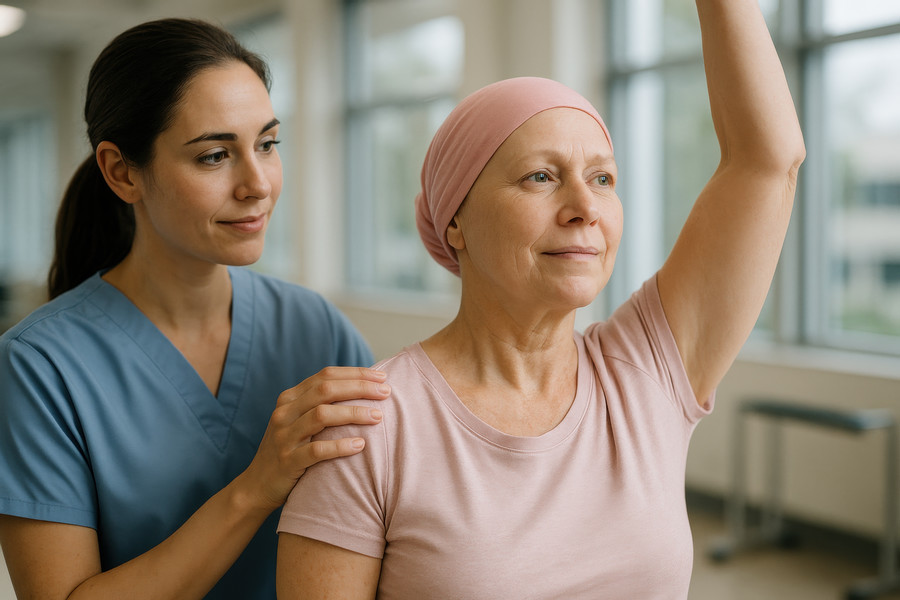Cancer Survivorship Care

Understanding Cancer Survivorship
Cancer survivorship starts from the time someone is told they have cancer and continues for the rest of their life. Anyone who has ever been diagnosed with cancer is called a cancer survivor, no matter where they are in treatment or recovery.
Survivorship is about how people live and feel after being told they have cancer. This includes their health, emotions, family life, and how they manage everyday challenges. Cancer survivors might have physical or emotional effects after treatment, but with the right care and support, they can live healthy and fulfilling lives.
Fast Facts About Cancer Survivors:
- As of January 2022, there are about 18.1 million cancer survivors in the United States. That’s about 5.4% of the population.
- 70% of cancer survivors in the U.S. have lived 5 or more years since their diagnosis.
- About 67% of cancer survivors are 65 years old or older.
- Survivors are more likely to get cancer again compared to people who have never had cancer, so follow-up care is very important.
- Exercise, a healthy diet, and emotional support can help improve the quality of life for cancer survivors.
Guide to Cancer Survivorship Care
Cancer Survivorship care is the health care and support that cancer survivors receive after their diagnosis. It helps survivors stay healthy, feel better, and watch for any signs that cancer might come back.
Survivorship care includes:
- Monitoring for recurrence and second cancers: Regular doctor visits help catch and improve any new health problems early (physical, emotional, medical, and mental health).
- Managing long-term side effects: Some cancer treatments cause lasting effects, like tiredness or nerve pain.
- Mental health and emotional support: Counseling, support groups, nutritional help, therapy, sexual health and fertility support can improve both quality of life and chances of survival.
- Healthy lifestyle choices: Eating a balanced diet, exercising, and quitting smoking can help stay healthy.
- Care coordination: Survivors may need to see different doctors, like a regular doctor, cancer specialists, and therapists, to help manage their health. It’s very important that survivors, caregivers, and health system teams collaborate well for better patient outcomes.
- Care planning: Discussing care plans and goal setting supports patient-guided care
- Identify additional risks: Checking for genetic risks or sending for genetic testing if needed.
The Experts Who Support You
- Oncologists and primary care providers: They help monitor health and manage follow-up care.
- Nutritionists and physical therapists: They can help with diet and exercise.
- Mental health professionals: They can help in supporting feelings like anxiety, depression, or fear of cancer coming back.
- Survivorship clinics: Special programs to help cancer survivors manage long-term health.
Life After Cancer: Taking Care of Yourself
Common Challenges for Cancer Survivors
- Fatigue: Feeling very tired, even after resting.
- Chemo brain: Problems with memory or focusing, like forgetfulness or trouble concentrating.
- Nerve pain or numbness: Feeling pain or losing feeling in parts of the body because of nerve damage.
- Fear of cancer coming back: Worrying that cancer might return.
- Emotional changes: Feeling anxious, sad, or stressed about the future.
- Relationship changes: Survivors might feel different in their personal or work relationships because of their experience.
The Importance of follow-up care:
Regular check-ups are important for cancer survivors to stay healthy. Follow-up care may include:
- Getting a follow-up care plan: This plan might include routine care from your regular doctor, along with special follow-up care for cancer.
- Avoid tobacco and limit alcohol: Smoking and drinking alcohol after treatment increases the risk of cancer returning. It’s important to quit smoking and limit alcohol consumption.
- Eat a healthy diet: Eating healthy food is important for your overall well-being. Ask the doctor if you have any special diet needs or if you should see a nutritionist for help.
- Stay up to date with screenings and vaccines: Talk to your doctor about which cancer screenings you need and when. Also, get the vaccines you need.
- Always use sunscreen: To lower the risk of skin cancer, use sunscreen and avoid tanning beds.
- Exercise and stay active: Staying active can help lower the risk of cancer coming back and improve mood and energy levels. Try to get 30 minutes of exercise (like walking, biking, or swimming) most days of the week.
- Manage stress: Practices like yoga, meditation, or talking to a therapist can help reduce stress.
- Connect with others: Joining support groups or talking to other cancer survivors can give encouragement.